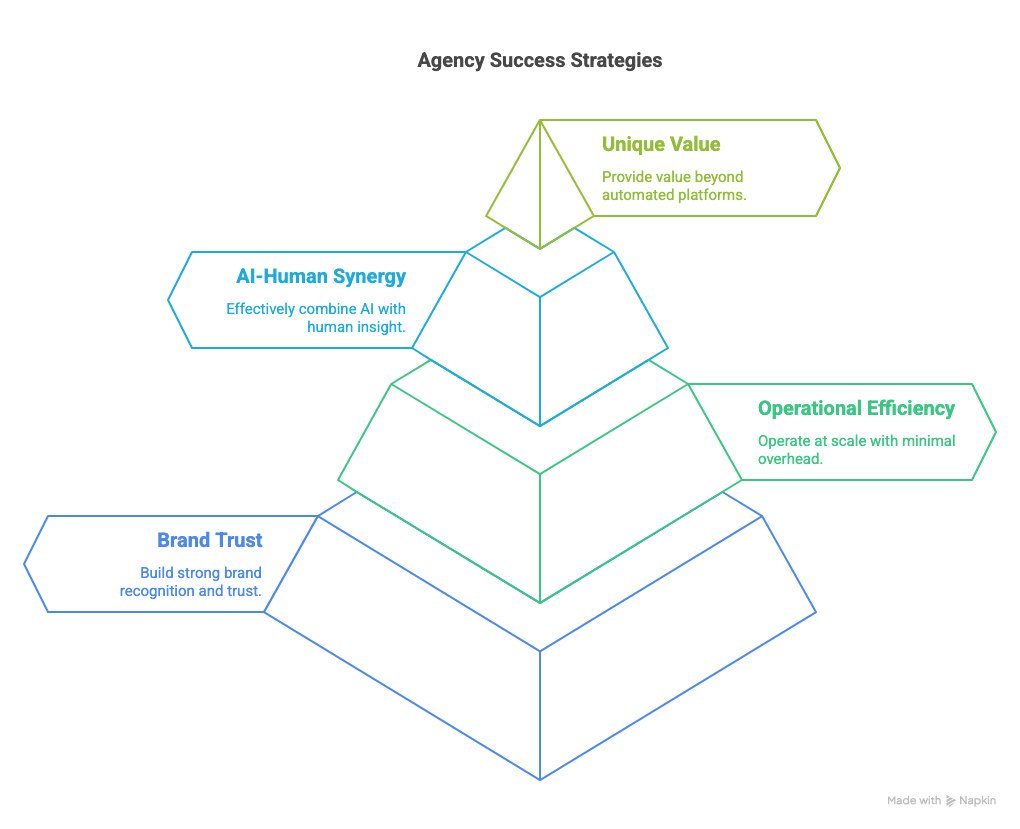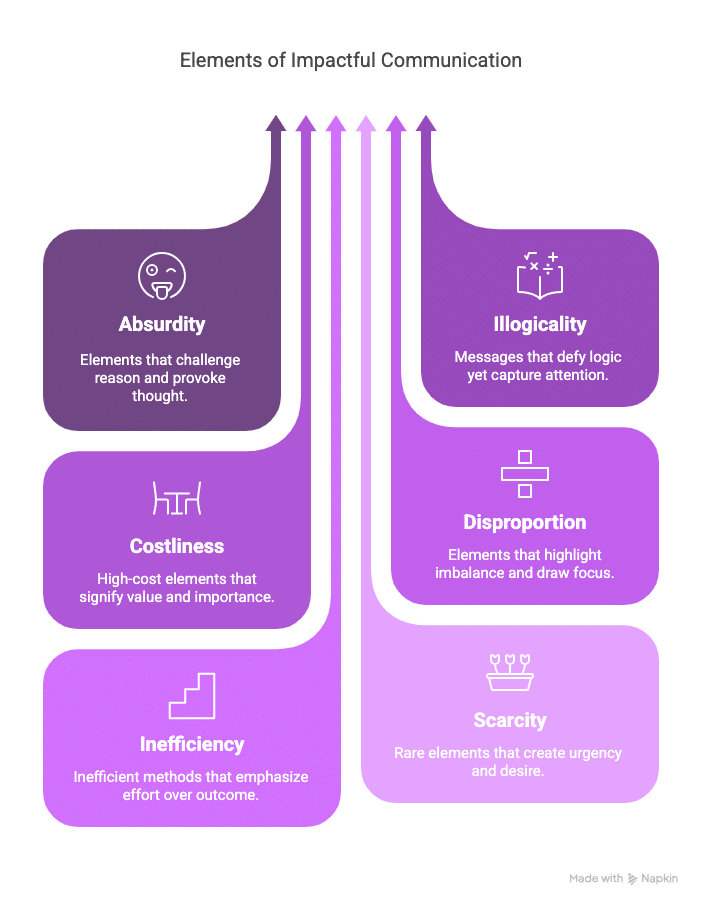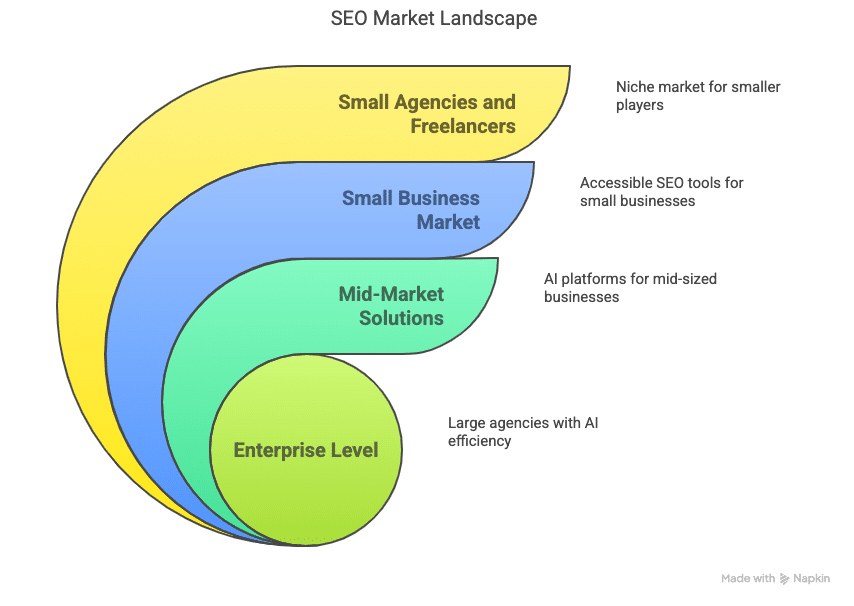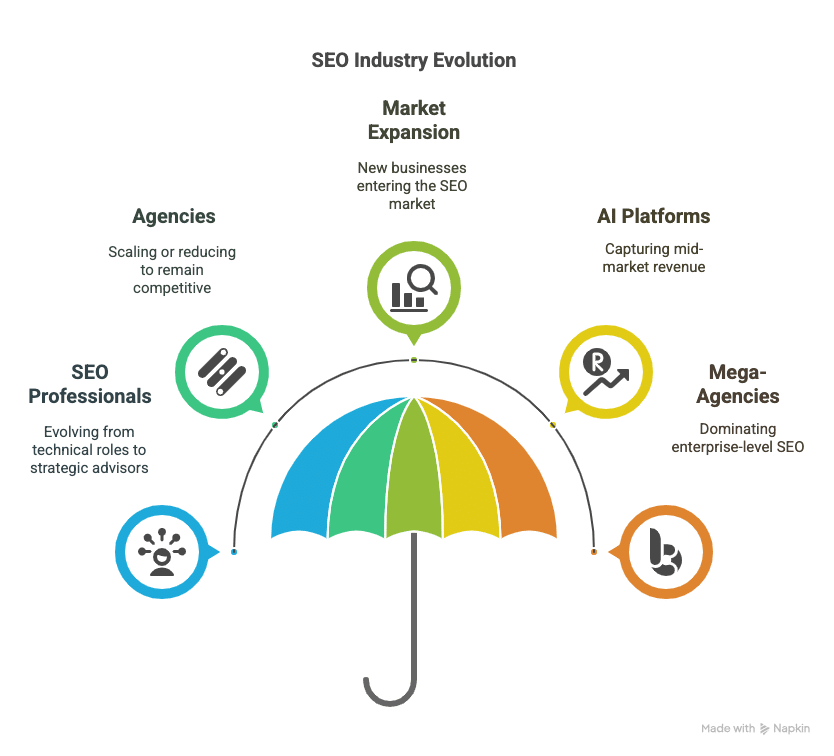Why AI will break the traditional SEO agency model

As AI-powered SEO platforms evolve, they’re rewriting the economics of search engine optimization.
This transformation threatens to upend the traditional agency model in three ways:
- Dramatically lower costs.
- Automate technical capabilities.
- Provide unbiased, data-driven decisions.
Yet, this disruption might lead to industry consolidation and expansion as fewer but larger agencies emerge to serve an expanding market of SEO adopters.
This article looks at how to survive the new agency economics.
The economics of disruption
Today’s SEO agency model typically involves monthly retainers ranging from $2,000 to $20,000, depending on the scope and complexity of services.
Even with premium pricing, AI-powered platforms might deliver comparable or superior results for a fraction of the cost – perhaps $500 to $2,000 monthly.
This dramatic price differential doesn’t just create competition; it fundamentally challenges the sustainability of traditional agency pricing structures.
Consider a mid-sized ecommerce website currently paying $5,000 monthly for SEO services.
An AI platform could deliver automated technical audits, content optimization recommendations, and competitive analysis for $750 monthly.
Even if the platform doubled or tripled its prices, it would remain significantly more cost-effective than traditional agency services.
At the same time, it provides in-house marketers with enough SEO expertise to tackle the job themselves, maximizing in-house budget.
For the SEO agency, this threat needs to be taken seriously.
When the clients can choose a platform over an agency, the agency model will hit a stumbling block.
The automated technical evolution
The technical capabilities of AI platforms represent the most immediate threat to traditional agencies.
These systems can now:
- Automatically detect and prioritize technical SEO issues.
- Generate and implement fixes for common problems.
- Monitor site health in real time.
- Adapt to algorithm updates more quickly than human teams.
- Assess competitor code changes to see impact across sites.
This automated approach has a significant impact on those skilled in technical SEO.
Even recently, we used AI to identify code-related issues in a client’s site that were not identified by traditional SEO tools.
As AI becomes more embedded within web and SEO platforms, we’ll see the value of technical expertise reduce.
This isn’t hype. The rise of no-code platforms is proof of this.
The benefit that tech SEOs should bring to their clients is knowing what needs doing and when based on experience.
But in an AI code era, websites can be made technically perfect and even “self-heal” code issues – essentially making tech SEO irrelevant.
The trust factor (No more snake oil)
The SEO industry has always had its share of spam.
A quick search online, and within seconds, you’ll find someone promising instant rankings for a cheap monthly fee.
It’s natural for agencies to prioritize their needs. They will sell a dream that will burn the industry one client at a time.
SEO-powered platforms change this.
These platforms provide unbiased, data-based advice.
They can see links being added, content changed, and technical fixes made, and they can track the results across sectors.
This feedback allows these tools to provide unbiased, non-agency advice.
And don’t think this is not going to happen.
Soon, SEO platforms will be able to look at any website and show all the changes and how they impacted SEO results.
It’s just a matter of time.
Weeks, months, or maybe a few years. But it’s coming.
OK, so that’s all the bad news.
What should you do?
The agency response
SEO agencies cannot sit on the fence right now.
The last few years have been mainly carnage for the SEO and content industry, and we have seen the freelancer market boom as agencies struggle to grow.
However, we need to understand that agencies suffered an artificial boost after COVID-19, and as such, we saw them grow far faster than they would have usually.
And then we’ve seen an overcorrection due to global economic issues.
Today, we are entering a lean phase in SEO, one in which AI efficiencies will lead to the greatest and most powerful agencies.

The most successful agencies will likely be those that can:
- Build strong brand recognition and trust.
- Operate at scale with minimal overhead.
- Effectively combine AI capabilities with human insight.
- Provide value beyond what automated platforms can deliver.
But this will battle head-on with SEO platforms.
The platforms we use to do our jobs will be battling for the customers directly.
It’s the natural next step.
Think DIY outlets. They sell to the professional and direct to the consumer.
This is where it’s heading.
Dig deeper: The billion-dollar one-person SEO agency: Fiction or the future?
Get the newsletter search marketers rely on.
See terms.
Market evolution
The SEO market appears headed for a paradoxical future.
As AI platforms make basic SEO more accessible, we’ll likely see:
- More businesses investing in SEO due to lower entry barriers.
- Fewer traditional SEO jobs as automation increases.
- A smaller number of larger, more efficient agencies.
- Higher overall market value but distributed differently.
The winners in this new landscape won’t necessarily be the agencies with the best technical capabilities – AI platforms will largely commoditize those.
Instead, success will likely come to those who can build the strongest brands and most efficient operations, potentially leading to a winner-takes-all scenario in the agency space.
And here we enter a rather unique battle.
AI can make a single freelancer or agency far more profitable while reducing the need for that agency or freelancer.
In an industry with less required expertise, lean agencies that acquire customers faster will grow and become stronger brands.
These agency brands will be wrappers covering the same ‘behind the scenes’ mechanics all agencies have.
Branding, reach, and visibility will be the key differentiators.
Whereas most agencies today are similar in branding and appeal, the agency of the future will stand out deliberately.
Agency marketing will be the big play.
Efficiencies will lead to higher profits, which can be poured into brand and customer experience.
Customers will likely choose agencies based on who they want to work with, and experiential factors will influence that decision.
While we know remote work is enormous in the SEO sector, having an office that clients want to hop onto a train or plane to visit might be a big factor in this landscape.
Your office and brand will be costly signaling factors.
As British advertising executive Rory Sutherland famously stated:
- “All-powerful messages must contain an element of absurdity, illogicality, costliness, disproportion, inefficiency, scarcity, difficulty or extravagance – because rational behavior and talk, for all their strengths, convey no meaning.”

Your brand and office are going to become powerful messages in the future.
Dig deeper: The SEO career crisis is coming: Are you ready?
The future landscape
The transformation of the SEO industry won’t happen overnight, but the writing is already on the wall.
As AI platforms become more sophisticated, we’re likely to see a four-tiered market emerge:

1. Enterprise level
Large, well-branded agencies serving corporations, combining AI efficiency with high-touch service and strategic oversight.
These agencies will likely command premium prices but operate with leaner teams than today’s agencies.
2. Mid-market solutions
AI platforms serve as the primary SEO solution for mid-sized businesses, with minimal human oversight required.
These platforms will offer sophisticated automation at a fraction of traditional agency costs.
3. Small business market
Democratized access to SEO tools and AI-driven recommendations, allowing small businesses to manage their SEO with minimal external support.
4. Small agencies and freelancers
They will scoop up the market that will be left over with those not interested in doing the SEO themselves and those who don’t have the time.
This might sound similar to today, but remember that AI efficiencies help larger agencies to become more profitable.
Today’s 60-person agency should probably be a 20-person agency, and it should use its profit to scale, acquire customers, and grow its brands.
Adding AI platforms opens a new level of competition against agencies operating in the smaller trenches.
Implications for the industry

This restructuring will have far-reaching consequences.
SEO professionals must evolve from technical practitioners to strategic advisors and AI platform specialists.
Agencies must either scale up significantly to compete at the enterprise level or dramatically reduce their overhead to remain viable in the mid-market.
The good news for the industry is that the overall SEO market is likely to expand.
Lower barriers to entry and more affordable solutions will bring new businesses into the SEO fold.
However, this growth will be distributed differently, with AI platforms capturing a larger share of the mid-market revenue while mega-agencies dominate the enterprise space.
Why this matters
While human expertise will remain valuable, the traditional agency model of high-overhead, technical-focused service delivery will likely become unsustainable for all but the largest, most efficiently operated firms.
For agency owners, the message is clear: adapt now or risk obsolescence.
This might mean investing heavily in brand building, dramatically reducing operational costs, or pivoting to become specialists in AI platform implementation and optimization.
The future belongs not to those with the best technical skills but those who can build the strongest agency brands and most efficient operations.
And that’s the brutal reality.
The future of SEO is one of extravagant and distinctive agency brands powered by highly efficient and profitable models.
How are you ready for this?
Dig deeper: 3 ways to use AI for SEO wins in 2025






Recent Comments